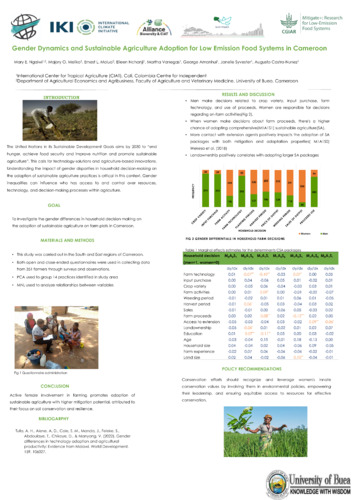Gender dynamics and sustainable agriculture adoption for low emission food systems in Cameroon
Sustainable agrifood systems have the potential to significantly impact the livelihoods of smallholder farmers in Cameroon. However, there is a gender disparity in the adoption of these technologies due to various sociocultural norms and gender dynamics. In 2020, 351 southern and eastern Cameroonian farming households were surveyed. Gender roles, decision-making, and sustainable agrifood systems were studied using a multistage random sample. The principal component analysis identified thirteen sustainable agrifood systems used by farmers and grouped them into practices with mitigation potentials, adaptation potentials, and soil conservation. Descriptive statistics examined gender differences in farm and household decision-making. A multinomial logit regression model (MNL) was used to examine how gender-based household decision-making affects farmer enrollment in sustainable agrifood systems. MNL marginal effects coefficients were used to interpret the effects of independent variables on the sustainable agrifood systems enrollment, controlling for other factors and allowing comparisons across variables. The results of the study reveal that women play a significant role in the technical aspects of farming (64.4%) and take most decisions regarding onfarm activities (70%). However, decisions regarding farm earnings (81.4%) and farm technology (84%) are made by men. Household decision-making, particularly by women, significantly (P≤0.001) influences the adoption of different sustainable agrifood system packages. The use of practices with mitigation potential and soil conservation practices increased for households with decisions made by females, while the use of practices with adaptation potential decreased. The study emphasises the importance of extension services in encouraging farmers to use larger (more than 3 practices) sustainable agrifood system packages. Education and land ownership also positively (P≤0.05) influenced sustainable agrifood systems, particularly those with mitigation potential. Women have little decision-making power in agricultural production, according to decision-making results. Thus, gender-equitable agrifood systems adoption policies and programmes are needed to empower women. Such efforts can increase agricultural productivity, economic empowerment of women, gender equity, and social justice.

